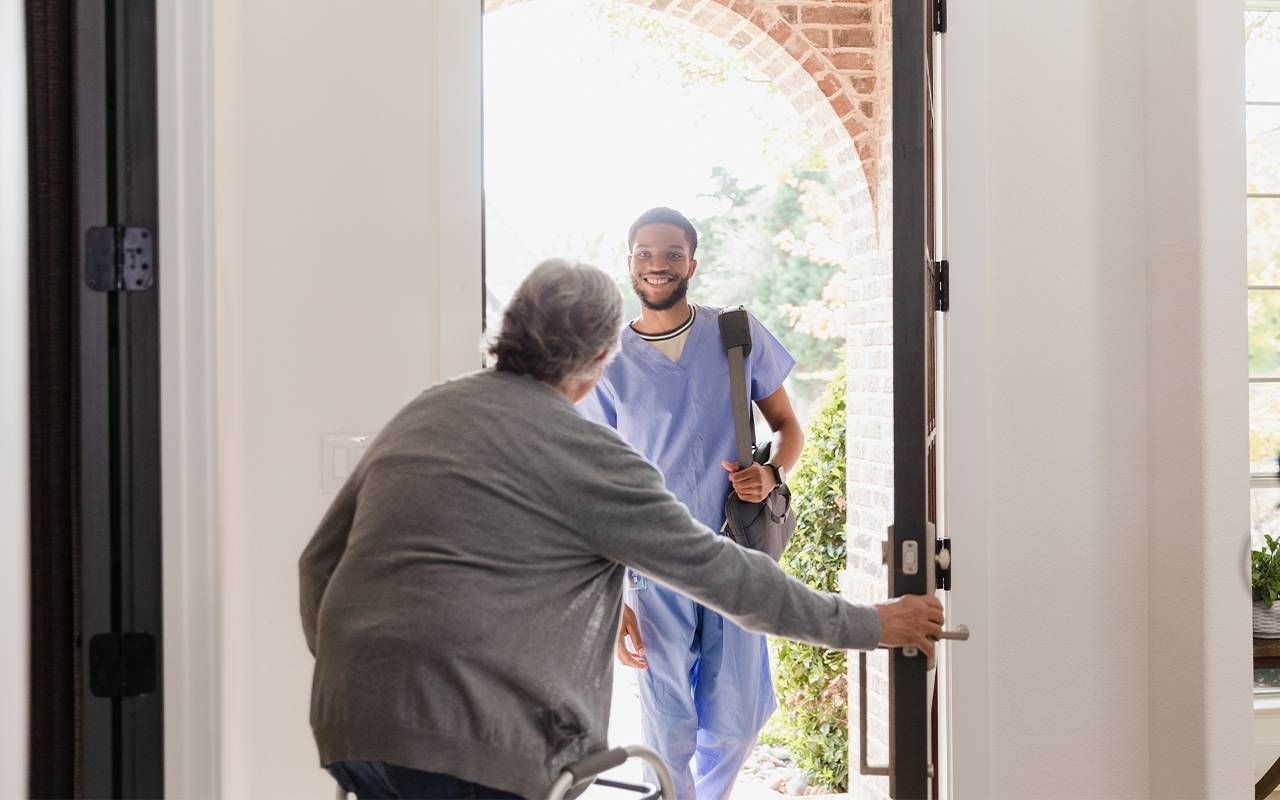What I Learned During My Father's Time in Hospice
Our family was able to focus on the here and now, be supported and prepare peacefully for my father's death
In September 2022, I accompanied my 82-year-old father to an appointment with his oncologist. My father had recently had a PET scan and the results were not good. After seven years on a successful immune-therapy drug regimen, his cancer had spread. The doctor told us it might be time to consider hospice care.

The American Cancer Society (ACS) states on its website, "Hospice care is a special kind of care that focuses on the quality of life for people who are experiencing an advanced, life-limiting illness and their caregivers."
Like many, I had coupled hospice with giving up, but that isn't fair or true.
The focus of care moves from treating the disease to treating pain, keeping the person comfortable, clean and safe. "Hospice care provides compassionate care for people in the last phases of incurable disease so that they may live as fully and comfortably as possible," explains the ACS.
While I had heard the term 'hospice' before, I didn't fully understand what it meant until my father entered this type of care. Like many, I had coupled hospice with giving up, but that isn't fair or true.
Death is a part of life, and hospice acknowledges that fact. Writer Catherine Newman of Massachusetts spent several months caring for a friend who went into hospice care at the end of her life. Newman says, "I learned that hospice is the most human place, both heartbreaking and beautiful at the same time."
Understanding Hospice
The idea of hospice care began in England in the 1950s. It came to the United States in 1974 when Florence Wald, two pediatricians, and a chaplain founded the Connecticut Hospice in Branford, Connecticut. In 1982, a federal bill made hospice care a covered benefit under Medicare.
Hospice care is for people who are expected to live six months or less and are no longer receiving life-extending treatments. It doesn't mean that the patient will live six more months (it can be substantially less, depending on when hospice care starts and the progression of the disease.) And in some cases, the person may live more than six months and the physician may have to ask for a care extension. Hospice care is not assisted suicide; drugs are not administered to cause death.
The Focus of Hospice Care
Hospice care moves the focus from disease treatment to comfort care and quality of life. The care includes pain management and other services, such as emotional and spiritual support. Hospice programs usually offer support for loved ones, including training on how to care for the person, and grief counseling.
While at-home hospice includes visits from nurses and aides, it is not 24/7 full-time assistance.
Hospice care can be administered at a person's home or a hospice facility. Determining which is best is an individual decision based on various factors.
The benefit of at-home hospice is that it allows the person to stay in their familiar surroundings. Equipment such as a hospital bed, oxygen tank and bath chairs can all be brought into the home to ensure the person is comfortable and safe. A "comfort kit" is also provided that includes medications for issues such as pain, nausea and anxiety.
While at-home hospice includes visits from nurses and aides, it is not 24/7 full-time assistance. Much of the care (such as help with bathing and administering medications) will fall on caretakers, either loved ones or outside aides (not covered by hospice and paid for out of pocket.)
For some people, in-patient hospice is a better alternative. Newman's friend was cared for at a hospice facility. Newman explains, "My friend had young children, so it wasn't feasible for her to be cared for at home. Also, her care needs were so intricate that in-patient hospice was the only choice."
Letting Go
Before that doctor's appointment, my father hadn't felt like himself for several weeks. He didn't have an appetite and was losing weight. He was also sleeping a lot more during the day. As his condition declined, he had confided in me that he didn't think he could go on much longer. But it wasn't in his nature to quit fighting, so he continued going to his treatments.
Instead of being upset when he heard the news, my father's first emotion was overwhelming relief.
Now the doctor was giving him permission to stop. Instead of being upset when he heard the news, my father's first emotion was overwhelming relief.
My father's feelings are not uncommon. "Hospitals don't want a person to die. It feels like a failure," explains Newman. "The person who is ill feels like they have let people down when they aren't cured. While it's terrible and devastating to learn you will die, it can also be somewhat of a relief, especially to someone who has been fighting and in pain for so long."
Simple Pleasures
In hospice, there is a lack of urgency. The focus becomes being here now, being alive in the present. "No one is waking you up to take your temperature or suggesting you eat healthy, well-balanced meals," Newman says.
No longer worried about prolonging life, hospice patients can indulge in simple pleasures. One afternoon, my dad was smoking a cigarette outside his home when his visiting nurse arrived. Rather than chastise or rush him, she kindly said, "Take your time; I'll wait." She pulled over a chair and sat down beside him.
Newman's experience caring for her friend in hospice was so powerful that it inspired her fictional novel "We All Want Impossible Things." She also became a hospice volunteer after her friend died.
Newman says, "People crave comfort food. I must have made thousands of grilled cheese sandwiches. They smoke pot, drink a little alcohol, listen to music — find joy where they can."
End of Life Conversations
In addition to checking vitals and adjusting medications, hospice workers support people as they "transition." The nurses and aides that visited with my dad were kind and empathetic. They created a safe environment for him to speak openly about his feelings.
"There is a lot of time just sitting around in hospice. You gossip, make small talk, and you laugh, too. "
Hospice also gives loved ones a chance to have tough conversations. It wasn't a secret to Dad or us that he was dying. So we took the opportunity to talk about that fact and discuss things like his funeral.
Says Newman, "It can feel scary to talk about the hard stuff. You worry you'll screw it up or say the wrong thing. But the person knows they are dying; without these conversations, they are alone with their thoughts. It's better to be courageous and take the risk. Hospice allows you the time and space to talk about this tough stuff."
Those difficult conversations with my dad made those first few days of grief much easier. There were many decisions, but we were at peace, confident we knew what he wanted.
Saying Goodbye
Being in hospice also gives people time to talk about other things, too. Newman says, "It's ironic; the person is dying, and yet it feels like there is all the time in the world. There is a lot of time just sitting around in hospice. You gossip, make small talk, and you laugh, too. "
People often get upset that the last conversation with a loved one was more meaningful, or they may feel guilty if they aren't physically there when the person dies. "They are looking for this teary, climactic moment like they have seen in the movies, but real death isn't like that," notes Newman. "Not every conversation will be profound."
Often, a person will have visitors almost around the clock and die when no one is in the room. Some believe that is because that is what the person wanted — they waited for their loved one to leave. Newman says, "It's the cumulative life that matters, not what happens in those final days or moments."
Initially, my brothers were against hospice care for my father. They felt it was admitting defeat. But the more we spoke with our dad and learned about hospice, we all realized it was the right choice. We had supported our dad throughout his life. Hospice allowed us to give him that same support as he faced the end of his life.


